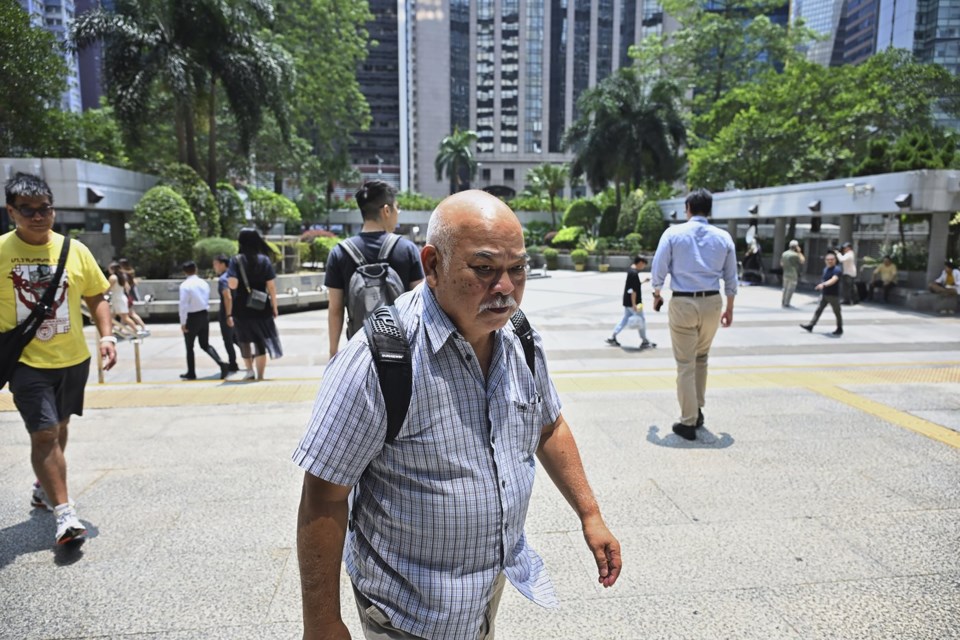HONG KONG (AP) — A Hong Kong court convicted two former editors of a shuttered news outlet on Thursday, in a sedition case widely seen as a barometer for the future of media freedoms in a city once hailed as a bastion of free press in Asia.
Stand News former editor-in-chief Chung Pui-kuen and former acting editor-in-chief Patrick Lam were arrested in December 2021. They pleaded not guilty to conspiracy to publish and reproduce seditious publications. Their trial was Hong Kong’s first involving the media since the former British colony returned to Chinese rule in 1997.
Stand News was one of the city’s last media outlets that openly criticized the government amid a crackdown on dissent that followed massive pro-democracy protests in 2019.
It was shut down just months after the pro-democracy Apple Daily newspaper, whose jailed founder Jimmy Lai is fighting collusion charges under a sweeping national security law enacted in 2020.
Chung and Lam were charged under a colonial-era sedition law used increasingly to crush dissidents. They face up to two years in prison and a fine of 5,000 Hong Kong dollars (about $640) for a first offense.
Best Pencil (Hong Kong) Ltd., the outlet’s holding company, was convicted on the same charge. It had no representatives during the trial, which began in October 2022.
Judge Kwok Wai-kin said in his written judgement that Stand News’ became a tool for smearing the Beijing and Hong Kong governments during the 2019 protests.
He said a conviction is deemed proportional “when speech, in the relevant context, is deemed to have caused potential damage to national security and intends to seriously undermine the authority of the Chinese central government or the Hong Kong government, and that it must be stopped.”
The case was centered on 17 articles. Prosecutors said some promoted “illegal ideologies,” or smeared the security law and law enforcement officers. Judge Kwok ruled that 11 carried seditious intent, including commentaries written by activist Nathan Law and esteemed journalists Allan Au and Chan Pui-man. Chan is also Chung’s wife.
The judge found that the other six did not carry seditious intent, including in interviews with pro-democracy ex-lawmakers Law and Ted Hui, who are among overseas-based activists targeted by Hong Kong police bounties.
Chung appeared calm after the verdict while Lam did not appear in court due to health reasons. They were given bail pending sentencing on Sept. 26.
Defense lawyer Audrey Eu read out a mitigation statement from Lam, who said Stand News reporters sought to run a news outlet with fully independent editorial standards. “The only way for journalists to defend press freedom is reporting,” Eu quoted Lam as saying.
Eu did not read out Chung's mitigation letter in court. But local media outlets quoted his letter, in which he wrote that many Hong Kongers who are not journalists have held to their beliefs, and some have lost their own freedom because they care about everyone’s freedom in the community.
“Accurately recording and reporting their stories and thoughts is an inescapable responsibility of journalists,” he wrote in that letter.
After the verdict, former Stand News journalist Ronson Chan said nobody had told reporters that they might be arrested if they did any interviews or write anything.
The delivery of the verdict was delayed several times for various reasons, including awaiting the appeal outcome of another landmark sedition case. Dozens of residents and reporters lined up to secure a seat for the hearing, which began an hour late.
Resident Kevin Ng, who was among the first in the line, said he used to be a reader of Stand News and has been following the trial. Ng, 28, said he read less news after its shutdown, feeling the city has lost some critical voices.
“They reported the truth, they defended press freedom," Ng, who works in risk management industry, said of the editors.
Stand News shut down in December 2021, following a police raid at its office and the arrests. Armed with a warrant to seize relevant journalistic materials, more than 200 officers participated in the operation.
Days after Stand News shut down, independent news outlet Citizen News also announced it would cease operations, citing the deteriorating media environment and the potential risks to its staff.
Hong Kong was ranked 135 out of 180 territories in Reporters Without Borders’ latest World Press Freedom Index, down from 80 in 2021. Self-censorship has also become more prominent during the political crackdown on dissent. In March, the city government enacted another new security law that raised concerns it could further curtail press freedom.
Francis Lee, journalism and communication professor at the Chinese University of Hong Kong, said the ruling on which articles were seditious appears to be drawing lines. Whenever an article is about a one-sided political stance, highly critical or viewed as lacking factual basis, then that could be considered as smearing, Lee said.
Some of the court's logic differs from how journalists typically think, he said. Journalists "may have to be more cautious from now on.”
Eric Lai, a research fellow at Georgetown Center for Asian Law, said the ruling is in line with “the anti-free-speech trend” of rulings since the 2020 security law took effect, criminalizing journalists carrying out their professional duties.
Foreign governments criticized the convictions. U.S. State Department spokesperson Matthew Miller wrote on X that it was a “direct attack on media freedom."
However, Eric Chan, Hong Kong's Chief Secretary for Administration, insisted that when journalists conduct their reporting based on facts, there would not be any restrictions on such freedom.
Steve Li, chief superintendent of the police national security department, told reporters the ruling showed their enforcement three years ago — criticized by some as a suppression of free press — was necessary.
Kanis Leung, The Associated Press

